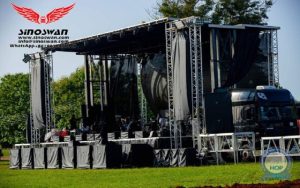In arranging an event, one of the essential factors that need to be considered is the layout of the stage. The focus is the stage which centers on a show, act, or airing a speech or any presentation. The event stages are important considerations if you’re planning an event that ranges from a concert, conference, wedding, or even a festival.
A well-designed event stage can:
Capture Attention: Clean stage design indexes the specification of the theater and pulls the target audience’s attention.
Enhance Visibility: This is a good design because any person who attends a given event would be in a position to view the stage well irrespective of his or her seat.
Support Technical Needs: Stages must ensure that facilities meet proper sound, lighting, and any other technical needs.
Create a Brand Statement: It can represent the theme of the event and the brand of the event’s organizer.

These are large structures that are normally Erected in theaters or auditoriums and are fixed to the building structure. They were intended for everyday use and give good sound quality and sight lines. This can however be a disadvantage for the application especially when events of several types are to be generated.
Portable event stage can be easily set up for different occasions particularly those that are being held outdoors. They are available in different sizes and can be accessorized with rims and seats. Tentage event: Concerts, festivals, fairs, and other community-based events are best suited for portable stages.
As for the mobile stages, they are specially constructed on trailers or trucks so that they can be easily moved from one place to another to be set up for events. They are suitable for roadshows, fairs, and festivals. Some of the common features of Sinoswan’s mobile stages are side and rear working platforms, built-in sound, and lights.
These event stages provide various height options; which will boost visibility and make an amazing show. Semi-enclosed stages are employed in majority concerning bands and stage troupes, giving a stunning visual spectacle.
In occasions like fashion shows or events that involve the audience, catwalks or stage additions can be incorporated. They allow the performer or the speaker to share information or have an interaction which is more intimate with the audience.
Knowing the size and configurations of your audience is very important. A larger audience could need a larger space and they also need great audio system to be heard well.
Think of the technical requirements as to the sound, lighting, and video. Check whether the stage should allow for all equipment that will be required such as microphones speakers, and projectors among others.
The stage should be constructed in such a way that it would allow every person who wants to attend the event to be able to do so regardless of his or her disability. Guard rails, ramps, and correct spacing should also be designed.
Safety is paramount. Make sure you use hard-wearing materials on the stage and that all equipment used is well-fixed. Adequate inspections are required so risks can be managed effectively.
The stage should be compliant with the theme and branding of the event. Using colors that create proper contrast, backdrops, and lighting that will make the experience more engaging.
Plan Ahead: Make event stage design plans before time if you expect to get some permits, rental, or construction time beforehand.
Collaborate with Professionals: Cooperate with professionals in the field of events, stages, lighting, and sound to guarantee the success of the event.
Test the Setup: Pre-event check by doing a sound check and check on the lighting and make sure that everything is okay.
Communicate with the Audience: Ensure there are proper and adequate signages and speaking announcements to direct people and improve their experience.
Capture the Moment: It may also be wise to install cameras in that event for live streaming or recording to avoid a live audience.
Sinoswan’s event stage is one of the essential factors that can change the whole appearance of an event and make it more enjoyable for the organizers and the guests. Knowing these types and factors will be beneficial when you decide to get a portable, mobile, or fixed stage. Applying all these aspects of scenery and stage design in event planning, your next event is assured to be in the spotlight!